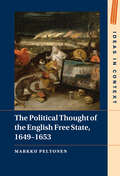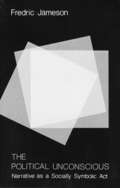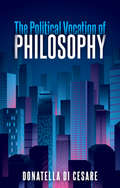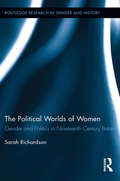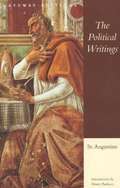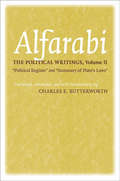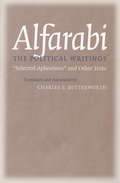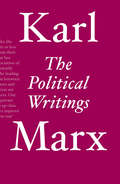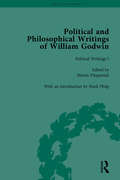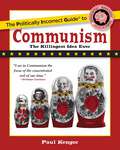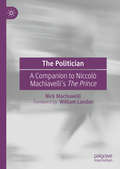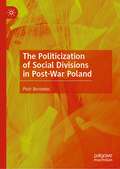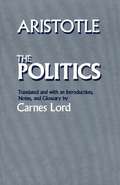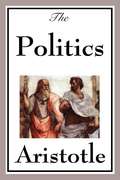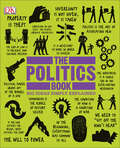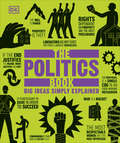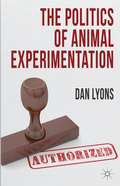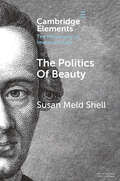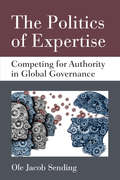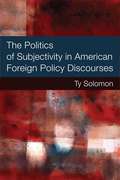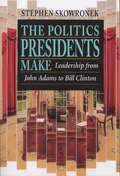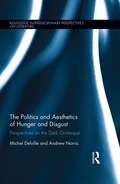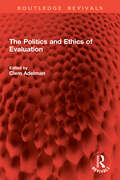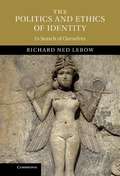- Table View
- List View
The Political Thought of the English Free State, 1649–1653 (Ideas in Context)
by Markku PeltonenEnglish republicanism has long been a major theme in the history of political thought, but the years of the English free state are often overlooked. Drawing on a wide range of sources, including the vast political pamphlet literature of the era, The Political Thought of the English Free State, 1649–1653 offers a provocative reassessment of the English Revolution and an original new perspective on English republicanism. Markku Peltonen explores the arguments in defence of the English free state and demonstrates the profound importance of the republican period. The pamphleteers who defended the free state maintained that the people, or their representatives, could alter the form of government whenever they deemed it advantageous, put forward powerful anti-monarchical arguments and widely shared the republican conviction that individual freedom could only materialise in a free state. Peltonen also highlights the unprecedented debate over whether the free state was an aristocracy or democracy and shows how, for the first time in English history, democracy was not only robustly defended but understood as representative.
The Political Unconscious: Narrative as a Socially Symbolic Act
by Fredric JamesonFredric Jameson, in The Political Unconscious, opposes the view that literary creation can take place in isolation from its political context. He asserts the priority of the political interpretation of literary texts, claiming it to be at the center of all reading and understanding, not just a supplement or auxiliary to other methods current today. Jameson supports his thesis by looking closely at the nature of interpretation. Our understanding, he says, is colored by the concepts and categories that we inherit from our culture's interpretive tradition and that we use to comprehend what we read. How then can the literature of other ages be understood by readers from a present that is culturally so different from the past? Marxism lies at the foundation of Jameson's answer, because it conceives of history as a single collective narrative that links past and present; Marxist literary criticism reveals the unity of that uninterrupted narrative. Jameson applies his interpretive theory to nineteenth- and twentieth-century texts, including the works of Balzac, Gissing, and Conrad. Throughout, he considers other interpretive approaches to the works he discusses, assessing the importance and limitations of methods as different as Lacanian psychoanalysis, semiotics, dialectical analysis, and allegorical readings. The book as a whole raises directly issues that have been only implicit in Jameson's earlier work, namely the relationship between dialectics and structuralism, and the tension between the German and the French aesthetic traditions. The Political Unconscious is a masterly introduction to both the method and the practice of Marxist criticism. Defining a mode of criticism and applying it successfully to individual works, it bridges the gap between theoretical speculation and textual analysis.
The Political Vocation of Philosophy
by Donatella Di CesareIt is time for philosophy to return to the city. In today’s crisis-ridden world of globalised capitalism, increasingly closed in on itself, it may seem harder than ever to think of ways out. Philosophy runs the risk of becoming the handmaiden of science and of a hollowed-out democracy. Donatella Di Cesare calls on philosophy instead to return to the political fray and to the city, the global pólis, from which it was banished after the death of Socrates. Suggesting a radical existentialism and a new anarchism, Di Cesare shows that Western philosophy has been characterised by a political vocation ever since its origins in ancient Greece, and argues that the separation of philosophy from its political roots robs it of its most valuable and enlightening potential. But critique and dissent are no longer enough. Mindful of a defeated exile and an inner emigration, philosophers should return to politics and forge an alliance with the poor and the downtrodden. This passionate defence of the political relevance of philosophy and its radical potential in our globalised world will be of great interest to students and scholars of philosophy and to a wide general readership.
The Political Worlds of Women: Gender and Politics in Nineteenth Century Britain (Routledge Research in Gender and History #12)
by Sarah RichardsonTraditional analyses of nineteenth-century politics have assigned women a peripheral role. By adopting a broader interpretation of political participation, the author identifies how middle-class women were able to contribute to political affairs in the nineteenth century. Examining the contribution that women made to British political life in the period 1800-1870 stimulates debates about gender and politics, the nature of authority and the definition of political culture. This volume examines female engagement in both traditional and unconventional political arenas, including female sociability, salons, child-rearing and education, health, consumption, religious reform and nationalism. Richardson focuses on middle-class women’s social, cultural, intellectual and political authority, as implemented by a range of public figures and lesser-known campaigners. The activists discussed and their varying political, economic and religious backgrounds will demonstrate the significance of female interventions in shaping the political culture of the period and beyond.
The Political Writings of St. Augustine
by Saint Augustine Henry PaolucciThe political ideas of St. Augustine, no less than his ideas on sin, grace, and predestination, have long been an object of controversy.
The Political Writings, Volume II: "Political Regime" and "Summary of Plato's Laws"
by Charles E. Butterworth AlfarabiAlfarabi (ca. 870-950) founded the great tradition of Aristotelian/Platonic political philosophy in medieval Islamic and Arabic culture. In this second volume of political writings, Charles E. Butterworth presents translations of Alfarabi's Political Regime and Summary of Plato's "Laws" , accompanied by introductions that discuss the background for each work and explore its teaching. In addition, the texts are carefully annotated to aid the reader in following Alfarabi's argument. An Arabic-English/English-Arabic glossary allows interested readers to verify the way particular words are translated. Throughout, Butterworth's method is to translate consistently the same Arabic word by the same English word, rendering Alfarabi's style in an unusually faithful and yet approachable manner. Political Regime consists of two parts. One focuses on nature and natural existing things as well as the principles beyond nature that guide the existing things. In the second part, the exposition centers on human beings and their place in the larger cosmic whole as well as on how a proper organization of human life in political association provides the conditions whereby human beings might achieve their purpose. Summary of Plato's "Laws" gives an account of the first nine books of Plato's Laws. Alfarabi explains Plato's art of writing in general and the method he follows in writing the Laws in particular. Unlike Alfarabi's other works, which examine the place of legislation and laws in the broader context of political philosophy, the Summary is a more specialized study of the question of laws and how and why they are formulated, with a particular focus on the relevance of Plato's investigation concerning Greek divine laws for the study and understanding of all divine laws.
The Political Writings: "Selected Aphorisms" and Other Texts
by Charles E. Butterworth AlfarabiAlfarabi was among the first to explore the tensions between the philosophy of classical Greece and that of Islam, as well as of religion generally. His writings, extraordinary in their breadth and deep learning, have had a profound impact on Islamic and Jewish philosophy. This volume presents four of Alfarabi's most important texts, making his political thought available to classicists, medievalists, and scholars of religion and Byzantine and Middle Eastern studies. In a clear prose translation by Charles E. Butterworth, these treatises provide a valuable introduction to the teachings of Alfarabi and to the development of Islamic political philosophy. All of these texts are based on new Arabic editions. Two of the texts--Book of Religion and Harmonization of the Two Opinions of the Two Sages: Plato the Divine and Aristotle--appear in English for the first time. The translations of the other two works--Selected Aphorisms and chapter five of the Enumeration of the Sciences--differ markedly from those previously known to English-language readers. Butterworth situates each essay in its historical, literary, and philosophical context. His notes help the reader follow Alfarabi's text and identify persons, places, and events. English-Arabic and Arabic-English glossaries of terms further assist the reader.
The Political Writings: The Revolutions Of 1848; Surveys From Exile; The First International And After (The\pelican Marx Library)
by Karl MarxAll of Marx’s essential political writing in one volumeKarl Marx was not only the great theorist of capitalism. He was also a superb journalist, politician, and historian. This book brings together all of his essential political and historical writings in one volume for the first time. These works allow us to see the depth and range of thought in the mature Marx, covering a period from the tumultuous revolutions of 1848 that rocked Europe through to the end of his life. With a foreword by Tariq Ali, and including The Communist Manifesto, The Eighteenth Brumaire of Louis Bonaparte, The Class Struggles in France, and The Critique of the Gotha Programme, this volume shows Marx at his most astute, analysing the forces of global capitalism as they played out in the world around him.
The Political and Philosophical Writings of William Godwin vol 1
by Martin Fitzpatrick Mark Philp Pamela Clemit William St.ClairContains all the major political, philosophical and educational writings of William Godwin, one of the foremost philosophers of his age. His work on government and individual freedom, "Political Justice", made him the chief exponent of English radicalism in the latter half of the 18th century.
The Politically Incorrect Guide to Communism (The Politically Incorrect Guides)
by Paul KengorA brand-new installment of the beloved Politically Incorrect Guide series! The Politically Incorrect Guide to Communism is a fearless critique of freedom's greatest ideological adversary, past and present.
The Politician: A Companion to Niccolò Machiavelli’s The Prince
by Nick MachiavelliThe age of princes has passed, but the age of politicians is at its heights. So is Niccolò Machiavelli’s The Prince any less relevant? No. But it needs an update, to reflect the political realities of our times. That is the purpose of this groundbreaking manuscript—a guide to success in contemporary politics, where the democratically-elected politician has assumed the role of the classical prince. Here is revealed how a politician must act if she wants to be successful, how she must plot her every move, whether dealing with colleagues, constituents, family members, bureaucrats, lobbyists or the media. Indeed, this manuscript is unique, for it exposes at a level of detail never seen before the inner workings of the mind of the contemporary politician. And while it may prove an asset to aspiring politicians, its frank and honest nature will no doubt strike fear in the hearts of incumbent politicians as it sheds light on their motives, intentions, and aspirations.
The Politicization of Social Divisions in Post-War Poland
by Piotr BorowiecThe monograph examines the sources of Polish social divisions. It explains their emergence and discusses the mechanisms behind their evolution from 1945-2022. The findings corroborate the idea that divisions were formed irrespective of the current state of social hierarchy, or the accepted interpretation of justice, and that they existed both in totalitarian and democratic systems alike. The book distinguishes the category of divisions from the practices of repartition, and demonstrates that the repartitions discussed in a political discourse do not generate divisions, but constitute the politicization of the latter. Repartitions are understood as discursive, dichotomic juxtapositions that result from the existence of divisions and can be used as political tools. It has been demonstrated that they can also function as analytical categories used with a view to determining the state of social inequalities. The notions of divisions and repartitions discussed in this volume confirm the existence of the continuity of changes and describe the evolution of Polish society has a consequence.
The Politics
by AristotleEvery state is a community of some kind, and every community is established with a view to some good; for mankind always acts in order to obtain that which they think good. But, if all communities aim at some good, the state or political community, which is the highest of all, and which embraces all the rest, aims at good in a greater degree than any other, and at the highest good.
The Politics Book: Big Ideas Simply Explained (DK Big Ideas)
by DKLearn about how the world of government and power works in The Politics Book.Part of the fascinating Big Ideas series, this book tackles tricky topics and themes in a simple and easy to follow format. Learn about Politics in this overview guide to the subject, great for novices looking to find out more and experts wishing to refresh their knowledge alike! The Politics Book brings a fresh and vibrant take on the topic through eye-catching graphics and diagrams to immerse yourself in. This captivating book will broaden your understanding of Politics, with:- More than 100 groundbreaking ideas in the history of political thought- Packed with facts, charts, timelines and graphs to help explain core concepts- A visual approach to big subjects with striking illustrations and graphics throughout- Easy to follow text makes topics accessible for people at any level of understandingThe Politics Book is a captivating introduction to the world's greatest thinkers and their political big ideas that continue to shape our lives today, aimed at adults with an interest in the subject and students wanting to gain more of an overview. Delve into the development of long-running themes, like attitudes to democracy and violence, developed by thinkers from Confucius in ancient China to Mahatma Gandhi in 20th-century India, all through exciting text and bold graphics.Your Politics Questions, Simply ExplainedThis engaging overview explores the big political ideas such as capitalism, communism, and fascism, exploring their beginnings and social contexts - and the political thinkers who have made significant contributions. If you thought it was difficult to learn about governing bodies and affairs, The Politics Book presents key information in a clear layout. Learn about the ideas of ancient and medieval philosophers and statesmen, as well as the key personalities of the 16th to the 21st centuries that have shaped political thinking, policy, and statecraft.The Big Ideas SeriesWith millions of copies sold worldwide, The Politics Book is part of the award-winning Big Ideas series from DK. The series uses striking graphics along with engaging writing, making big topics easy to understand.
The Politics Book: Big Ideas Simply Explained (DK Big Ideas)
by DKLearn about how the world of government and power works in The Politics Book.Part of the fascinating Big Ideas series, this book tackles tricky topics and themes in a simple and easy to follow format. Learn about Politics in this overview guide to the subject, great for novices looking to find out more and experts wishing to refresh their knowledge alike! The Politics Book brings a fresh and vibrant take on the topic through eye-catching graphics and diagrams to immerse yourself in. This captivating book will broaden your understanding of Politics, with:- More than 100 groundbreaking ideas in the history of political thought- Packed with facts, charts, timelines and graphs to help explain core concepts- A visual approach to big subjects with striking illustrations and graphics throughout- Easy to follow text makes topics accessible for people at any level of understandingThe Politics Book is a captivating introduction to the world's greatest thinkers and their political big ideas that continue to shape our lives today, aimed at adults with an interest in the subject and students wanting to gain more of an overview. Delve into the development of long-running themes, like attitudes to democracy and violence, developed by thinkers from Confucius in ancient China to Mahatma Gandhi in 20th-century India, all through exciting text and bold graphics.Your Politics Questions, Simply ExplainedThis engaging overview explores the big political ideas such as capitalism, communism, and fascism, exploring their beginnings and social contexts - and the political thinkers who have made significant contributions. If you thought it was difficult to learn about governing bodies and affairs, The Politics Book presents key information in a clear layout. Learn about the ideas of ancient and medieval philosophers and statesmen, as well as the key personalities of the 16th to the 21st centuries that have shaped political thinking, policy, and statecraft.The Big Ideas SeriesWith millions of copies sold worldwide, The Politics Book is part of the award-winning Big Ideas series from DK. The series uses striking graphics along with engaging writing, making big topics easy to understand.
The Politics Of Animal Experimentation
by Dan LyonsThe reality of animal experimentation and its regulation in Britain have been hidden behind a curtain of secrecy since its emergence as a political controversy in the 1870s. Public debate and political science alike have been severely hampered by a profound lack of reliable information about the practice. In this remarkable study, Dan Lyons advances and applies policy network analysis to investigate the evolution of British animal research policy-making.
The Politics Of Beauty: A Study Of Kant's Critique Of Taste (Elements in the Philosophy of Immanuel Kant)
by Susan Meld ShellThis Element examines the entirety of Kant's Critique of Taste (in Part One of the Critique of Judgment) with particular emphasis on its political and moral aims. Kant's critical treatment of aesthetic judgment is both an extended theoretical response to influential predecessors and contemporaries, including Rousseau and Herder, and a practical intervention in its own right meant to nudge history forward at a time of civilizational crisis. Attention to these themes helps resolve a number of puzzles, both textual and philosophic, including the normative force and meaning of judgments of taste, and the relation between natural and artful beauty.
The Politics Of Expertise: Competing For Authority In Global Governance
by Ole Jacob SendingExperts dominate all facets of global governance, from accounting practices and antitrust regulations to human rights law and environmental conservation. In this study, Ole Jacob Sending encourages a critical interrogation of the role and power of experts by unveiling the politics of the ongoing competition for authority in global governance. Drawing on insights from sociology, political science, and institutional theory, Sending challenges theories centered on particular actors' authority, whether it is the authority of so-called epistemic communities, the moral authority of advocacy groups, or the rational-legal authority of international organizations. Using in-depth and historically oriented case studies of population and peacebuilding, he demonstrates that authority is not given nor located in any set of particular actors. Rather, continuous competition for recognition as an authority to determine what is to be governed, by whom, and for what purpose shapes global governance in fundamental ways. Advancing a field-based approach, Sending highlights the political stakes disguised by the technical language of professionals and thus opens a broader public debate over the key issues of our time.
The Politics Of Reality: Essays In Feminist Theory
by Marilyn FryeEssays examine sexism, the gay rights movement, the exploitation of women by men, and other topics from a feminist perspective.
The Politics Of Subjectivity In American Foreign Policy Discourses
by Ty SolomonWhy are some discourses more politically efficacious than others? Seeking answers to this question, Ty Solomon develops a new theoretical approach to the study of affect, identity, and discourse--core phenomena whose mutual interweaving have yet to be fully analyzed in International Relations. Drawing upon Jacques Lacan's psychoanalytic theory and Ernesto Laclau's approach to hegemonic politics, Solomon argues that prevailing discourses offer subtle but powerfully appealing opportunities for affective investment on the part of audiences. Through empirical case studies of the affective resonances of the war on terror and the rise and fall of neoconservative influence in American foreign policy, Solomon offers a unique way to think about the politics of identity as the construction of "common sense" powerfully underpinned by affective investments. He provides both a fuller understanding of the emotional appeal of political rhetoric in general and, specifically, a provocative explanation of the reasons for the reception of particular U. S. foreign policy rhetoric that shifted Americans' attitudes toward neoconservative foreign policy in the 1990s and shaped the post-9/11 "war on terror. "
The Politics Presidents Make: Leadership from John Adams to Bill Clinton, Revised Edition
by Stephen SkowronekStephen Skowronek’s wholly innovative study demonstrates that presidents are persistent agents of change, continually disrupting and transforming the political landscape. In an afterword to this new edition, the author examines “third way” leadership as it has been practiced by Bill Clinton and others. These leaders are neither great repudiators nor orthodox innovators. They challenge received political categories, mix seemingly antithetical doctrines, and often take their opponents’ issues as their own.
The Politics and Aesthetics of Hunger and Disgust: Perspectives on the Dark Grotesque (Routledge Interdisciplinary Perspectives on Literature)
by Andrew Norris Michel DelvilleThis study examines how hunger narratives and performances contribute to a reconsideration of neglected or prohibited domains of thinking which only a full confrontation with the body’s heterogeneity and plasticity can reveal. From literary motif or psychosomatic symptom to revolutionary gesture or existential malady, the double crux of hunger and disgust is a powerful force which can define the experience of embodiment. Kafka’s fable of the "Hunger Artist" offers a matrix for the fast, while its surprising last-page revelation introduces disgust as a correlative of abstinence, conscious or otherwise. Grounded in Kristeva’s theory of abjection, the figure of the fraught body lurking at the heart of the negative grotesque gathers precision throughout this study, where it is employed in a widening series of contexts: suicide through overeating, starvation as self-performance or political resistance, the teratological versus the totalitarian, the anorexic harboring of death. In the process, writers and artists as diverse as Herman Melville, Percy Bysshe Shelley, Christina Rossetti, George Orwell, Knut Hamsun, J.M. Coetzee, Cindy Sherman, Pieter Breughel, Marina Abramovic, David Nebreda, Paul McCarthy, and others are brought into the discussion. By looking at the different acts of visceral, affective, and ideological resistance performed by the starving body, this book intensifies the relationship between hunger and disgust studies while offering insight into the modalities of the "dark grotesque" which inform the aesthetics and politics of hunger. It will be of value to anyone interested in the culture, politics, and subjectivity of embodiment, and scholars working within the fields of disgust studies, food studies, literary studies, cultural theory, and media studies.
The Politics and Ethics of Evaluation (Routledge Revivals)
by Clem AdelmanFirst published in 1984, The Politics and Ethics of Evaluation considers, from the vantage point of the authors’ considerable experience of a wide range of evaluation, the ways in which they, and others, have coped with ethical and political problems that inherently arise during the evaluation process, particularly that of the responsive or democratic type. It looks at the evaluator’s claim to independence and how this is qualified by his relationship to his subject and to various other audiences.The ethical and political problems of evaluation are discussed from the different perspectives of moral philosophy, sociology, the politics of organisations, curriculum development, and institutional evaluation. Also included is a chapter detailing English law and legal judgements pertaining to qualified privilege, libel and defamation of character. Guidelines for conducting independent evaluation conclude the volume. This book will be of interest to students and researchers of higher education, curriculum studies and ethics.
The Politics and Ethics of Identity
by Richard Ned LebowWe are multiple, fragmented, and changing selves who, nevertheless, believe we have unique and consistent identities. What accounts for this illusion? Why has the problem of identity become so central in post-war scholarship, fiction, and the media? Following Hegel, Richard Ned Lebow contends that the defining psychological feature of modernity is the tension between our reflexive and social selves. To address this problem Westerners have developed four generic strategies of identity construction that are associated with four distinct political orientations. Lebow develops his arguments through comparative analysis of ancient and modern literary, philosophical, religious, and musical texts. He asks how we might come to terms with the fragmented and illusionary nature of our identities and explores some political and ethical implications of doing so.
